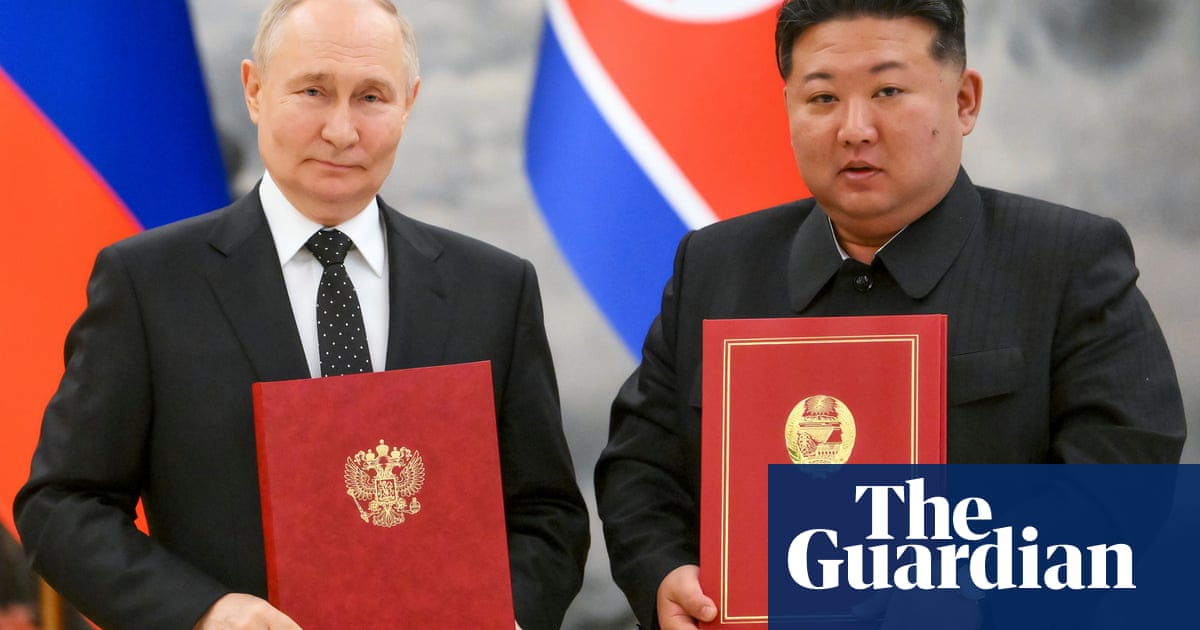Watt responds to Guardian investigation into tracking of employees in Woolworths-owned warehouses

Ariel Bogle
The federal minister for employment and workplace relations, Murray Watt, has responded to a Guardian Australia investigation into how employees in Woolworths-owned warehouses are being tracked and timed. He says that while there may be benefits, new workplace technology needs to be managed in a way that “protects and respects” workers’ rights:
In some cases, there’s clearly a disconnect between employers’ expectations of what new technology can deliver and what is safe and sustainable for workers. At the end of the day, workers are entitled to safe workplaces and fair working conditions.
Workers told Guardian Australia they are under pressure to meet time standards they say are unfair and putting safety at risk. In response to the Guardian investigation, a spokesperson for Primary Connect – Woolworths’ supply chain arm – said the company was committed to ensuring its workplaces were safe and productive.

Watt said the government’s inquiry into the digital transformation of workplaces will look at the impact of AI:
We need to ensure that automation-led management considers the circumstances of individual workers and doesn’t expose them to unsafe and unfair working conditions.
We need to make sure appropriate mechanisms are in place to bring unions and employers together to work collaboratively as we all grapple with the emergence of new technologies and their impacts in the workplace.
Key events Show key events only Please turn on JavaScript to use this feature
Miles says Crisafulli can’t promise no change to abortion laws while also allowing conscience vote
Earlier, the Queensland LNP leader David Crisafulli told ABC News Breakfast that there would be “no change to abortion laws” and accused Labor of running a scare campaign (see earlier post).
Steven Miles was asked to respond to this on the program, and said Crisafulli had “not been able to give a straight answer to that question at all during this campaign.”
I think media outlets have added up, that they’ve asked him more than 160 times, and the fact is that’s just a promise he can’t deliver.
The Katter party will move a private members bill that would give the state the power to force a woman to stay pregnant if she didn’t want to be. We know that nearly all his MPs and candidates would vote for that bill because he’d give them a conscience vote.
Queensland women have to ask themselves – are you absolutely sure that there would be no change to your right to choose? If you’re not absolutely sure, then change is a risk you can’t afford.
Miles defends government spending ahead of Queensland election
The Queensland premier, Steven Miles, made the rounds on breakfast television this morning and also spoke with ABC News Breakfast (we brought you his comments on the Today Show here).
Miles was asked if he had given thought to potential economic impacts of “splashing all this cash around” in the lead up to the election – with election promises on a free school lunch program, re-establishing a publicly owned power retailer and building state-owned petrol stations.
Miles said the state could afford this because “our economy is strong and because we made tough decisions, like increasing those coal royalties.”
The LNP opposed that, but we believe that when coal companies are making super profits, Queenslanders deserve to get a fair share of that …
We will return to surplus in 2026-27. We’ve just come out of two record surplus years, and so this is really saying to Queenslanders that, in this period of time where we know inflation and higher interest rates are really crunching on them, that we can afford to support them because we have that strong economy and really low unemployment.

Andrew Messenger
Queensland LNP leader spends final morning before election at Walk for Daniel
LNP leader David Crisafulli has spent the final morning before Queensland election day at the Walk for Daniel, on the Sunshine Coast.
The event is held by the Daniel Morcombe foundation, in honour of the young murder victim. It is in its 20th year.
He was joined by federal opposition leader Peter Dutton, governor Jeannette Young and thousands of ordinary people wearing red shirts.
Albanese and Starmer meet for first time since latter took office
Anthony Albanese has met with the UK prime minister, Keir Starmer, on the sidelines of the Commonwealth heads of government meeting in Samoa. It was the first meeting between the two PMs since the election of the Starmer government.
A joint statement said the leaders discussed the Australia-UK relationship, considering whether the two nations could “step-up their work together to meet common challenges and to realise new opportunities.”
Conversation topics included climate change and energy, with the PMs agreeing to enhance bilateral cooperation on this via the Australia-UK Climate and Energy Partnership.

Grant recipients were announced under the joint hydrogen innovation partnership program, which will support six projects focused on industrial decarbonisation.
The leaders discussed gains under the free-trade agreement, also discussing defence and strategic cooperation to ensure “the Aukus partnership delivers for the security and stability of the Indo-Pacific and beyond.”
They reaffirmed commitment to negotiating a bilateral treaty to develop the SSN-Aukus submarine for both nations, along with an approach that “sets the highest non-proliferation standards” and centres “peace, stability and prosperity”.

Karen Middleton
Shorten says Thorpe protest won’t help Indigenous Australians
The NDIS minister Bill Shorten has condemned independent senator Lidia Thorpe’s protest against King Charles as attention seeking that would not materially help the circumstances of Indigenous Australians.
Thorpe shouted in protest at the king during his parliamentary reception on Monday, demanding a treaty with Indigenous Australians and declaring him “not our king”:
Shorten told Nine’s Today show this morning that Thorpe was “just seeking attention”.
This is a person who thinks that performative yelling is going to extend the life expectancy of First Nations people – it won’t. This is someone who thinks that swearing at the king is going to see more Aboriginal kids finish school – it won’t. This doesn’t help the health or job outcomes of First Nations people. It’s pressure group tactics.
Shorten said Thorpe was squandering “the privilege of being in the Senate” by resorting to “look-at-me tactics”.
Speaking on the same program, the opposition leader, Peter Dutton, raised concerns about whether Thorpe was properly sworn into the Senate, after Thorpe raised doubts by highlighting that she had mispronounced part of it and then backtracked and said she had simply misspoken.
Constitutional expert and Sydney University professor emerita Anne Twomey has said Thorpe signed the required documentation to join the Senate and that was the key.
Man charged with domestic violence murder in Sydney
A man has been charged with domestic violence-related murder in western Sydney following an alleged fatal stabbing of a 64-year-old man, AAP reports.
The 34-year-old man, known to the deceased, was denied bail and is set to face Parramatta Local Court this morning.
Emergency services were called to a home on Layton Street, Wentworthville at 6.30am yesterday. Police officers found a man who had allegedly been stabbed in the neck.
Paramedics were present but the man died at the scene. A 60-year-old woman at the property was not injured in the incident. Police have established a crime scene.

Carr criticises government handling of Gaza conflict
Wrapping up the interview, Kim Carr also argued that Labor’s handling of the conflict in Gaza hasn’t been good enough – and the country is “deeply divided” now.
Now, I know the polls will tell you that most people don’t care much about it, but those that do care about it are highly concentrated – and they’re concentrated in the particular electorates.
And I think there is a deep, deep concern in those electorates about the issues that have now been well over a year in terms of the current war in Gaza, which of course go back way beyond the circumstances of the current conflict.
Aukus 'regrettable' and 'undermines national sovereignty', Carr says
Kim Carr argued that the Labor party has learnt “all the wrong lessons” from the Kevin Rudd and Julia Gillard time.
He said the party caucus isn’t ensuring a “proper questioning” of government direction, or assessment of policy options – pointing specifically to the Aukus submarine deal with the US and UK:
The decision we’re taking, for instance, on submarines, is one that I think is to be regretted. It is a proposition which I think shows that we’ve adopted a project that actually was promoted by the conservatives, and so the conservatives are ruling from beyond the grave, particularly [Scott] Morrison’s attitude. So I think the submarine program is essentially unaffordable, undeliverable and undermines our national sovereignty.
Carr says Labor can’t rely on ‘identity politics’ base but should fulfil ‘historic mission’ to represent whole country
Continuing his ABC RN interview, former Labor senator Kim Carr argued there has been attempts by conservative media to “delegitimise the Labor party.”
Asked how Labor can appeal to suburban workers – and if Peter Dutton is doing a better job at this – Carr said a return to “humanist universalism” is needed, explaining it as:
Our commitment to social justice, to economic equity, economic prosperity, to human rights – and we need to do so in a manner which we don’t neglect the fact that the country is more diverse, and it is open to a whole range of different views.
We simply can’t rely on … an identity politics base, in terms of relying increasingly on self-isolating grievance groups, race or ethnicity, on gender and sexual orientation. We need to be able to appeal more broadly across the community to ensure that the Labor party fulfils its historic mission to represent the whole country, but particularly people that are disadvantaged by life circumstances.
Carr argues that Labor lacks policy ambition
Kim Carr told ABC RN that Anthony Albanese has “faced difficult circumstances” as prime minister but the current predicaments facing the government are “quite predictable”.
He said that Labor had got into office on the basis of a “small target strategy” and that “many people don’t seem to be able to identify the ambition that’s needed to actually transform the country”.
It was disturbing to read recent polls that showed that most people couldn’t identify the key issues that the government was pursuing. A third of people said they couldn’t even remember the tax cuts, and so I’m worried that we have not shown the appropriate level of ambition in terms of seeking to advance a Labor agenda which attracts support rather than that repels it, and that actually ensures that we don’t adopt a censorious tone towards those people who disagree with us.
In terms of the next election, Carr believes “the Labor project is in trouble” and “we do need to be able to move more effectively to avoid minority government”.
Carr says Labor made ‘error of judgment’ in pursuing voice referendum on the back of low primary vote
On the Indigenous voice referendum, Kim Carr argued that Labor “made an error of judgment” going ahead with the vote “when we understood just what the historical pattern was when you lost bipartisanship”.
He said that Labor went into the referendum campaign “out of spirit of hubris”, forgetting that the primary vote for Labor in 2022 election was the lowest since 1934.
We didn’t have this grand alliance to call back on. We, in fact, had just got in with a lower vote in 2022 than we got in 2019 and I think we made assumptions about how we could turn that around, particularly given the reactionary position that it was being taken by the Liberals, by the party, which – of course – was playing up these huge divisions that occurred In the country in terms of the polarisation of political attitudes.
Carr said “of course it was proper that we seek the basic justice for Indigenous people” but “we want to make sure we don’t set back the cause”.

People who need government most turning to the right in ‘disturbing’ trend: Carr
Former Victorian socialist left leader and senator Kim Carr has been speaking with ABC RN about his book – reflecting on 50 years of membership with the Labor party.
Asked if Labor is losing touch with its blue-collar base – as he argues in his book – Carr said it was “disturbing” that Labor’s vote seems to be “going up in more affluent areas and going down in areas that are more socially disadvantaged”.
But this wasn’t unique to the Labor party, he said, arguing that people who need the government the most are moving to the right, around the world:
This decoupling, if you like, is common in countries in Europe and England [and] in the United States, that the traditional form of representation through social democracy has seen that people that are better educated, better off financially, more affluent and [with] better life circumstances are turning to the left, whereas people that actually need governments the most are turning to the right. And that’s a disturbing development from my point of view.
Rudd and Gillard had a secret deal, Carr claims in new book
“If we won the 2007 election, which we did under Kevin’s leadership, he would remain as prime minister for two terms and in the third term Julia would take over. That was the agreement that had been struck [in my flat].”
This is how Kim Carr lays out his account of what he claims was a secret deal between Labor’s “dream team”, in his new memoir, A Long March. Carr details how their agreement fell apart – alleging Gillard used “tricked-up” polling paid for by the mining industry to justify breaking the pact.
Paul Daley has the whole, gripping yarn below:
Carr is speaking with ABC RN now – we’ll bring you the latest in a moment.
No-grounds eviction ban passes in NSW
A long-awaited ban on landlords evicting tenants for no reason passed the NSW parliament last night, AAP reports, along with other changes hoped to rebalance the nation’s most expensive rental market.
More than 2.2 million tenants have been waiting for the overhaul after Labor and the Coalition went into the 2023 state election promising to ban no-grounds evictions.
The NSW Tenants’ Union chief executive, Leo Patterson Ross, said the threat of eviction made tenants hesitant to ask for repairs or negotiate rent hikes:
This is the single most significant change we can make to residential tenancies law, as without protection from unfair eviction in place we can’t rely on other parts of the law to function properly.
The Homelessness NSW CEO, Dominique Rowe, said the changes should relieve some pressure on homelessness services, which more than 68,000 people turned to for help every year.
One of the main causes of homelessness is eviction from private rentals, so anything we can do to reduce evictions will keep people in housing and take pressure off our homelessness services.

However, more social housing needs to be built, with 58,000 on waitlists for up to five years. The housing minister, Rose Jackson, said the changes to tenancies were straightforward and reasonable.
There are millions of renters in our state … for those millions of people they have a reasonable expectation the rental market will provide them with safe and secure housing.
Opponents to the bill expressed concerns it made investment less attractive and would not help increase housing supply.
Miles says he won’t make deals with minor parties to form government
The Queensland premier, Steven Miles, also spoke with the Today show before tomorrow’s election.
After Annastacia Palaszczuk resigned last December, Miles has had 10 months to prove he deserves a four-year term in his own right. He said that, in this time, he has “shown Queenslanders that I am pretty different”:
We increased those coal royalties and use them to deliver cost of living relief to every single Queenslander, as well as a comprehensive plan for healthcare, for housing and for community safety. And I’m saying to Queenslanders that if you want to see more of what I’ve done these last 10 months, give me a mandate in my own right tomorrow.
After comments from the opposition leader, David Crisafulli, that Labor was doing deals with the Katters in the regions, Miles ruled this out:
No, there’ll be no deals with the minor parties to form government … I’ve given that commitment. I’m campaigning for a majority government, that’s my goal.

Miles argued the Katter party “put the LNP in quite a bind – but it was a bind of their own making” regarding the private member’s bill on abortion:
[The LNP was] trying to hide their position and Robbie [Katter] really just forced them to come clean with Queenslanders. And we know that means that most of them – almost all of them – believe that women should be forced to stay pregnant when they get pregnant. And I think that’s something that a lot of Queenslanders don’t agree with.
Chalmers links Middle East conflict to inflation fight

Karen Middleton
The treasurer, Jim Chalmers, has weighed into debate over the Middle East conflict, telling global financial counterparts in Washington DC that any escalation represents a threat to the international economy and will make the fight against inflation harder.
In a speech to G20 economic and finance ministers and other senior leaders gathered for meetings of the Monetary Fund and World Bank, Chalmers has directly linked the now-multi-front Middle East conflict to the fate of the economy, internationally and at home.
The global economy is uncertain and the global outlook is unsettling.
The treasurer warned that any escalation of the conflict risked entrenching inflation problems worldwide:
A broader war could put upward pressure on oil prices, prolong the fight against inflation and threaten the soft landing that we all seek. In seeking ceasefire and de-escalation, we are focused on the human catastrophe but there are economic consequences too. We know that more bloodshed is one of the biggest threats to the global economy. None of us will escape the economic consequences of an escalating war in the Middle East.
The speech is Chalmers’ most direct public intervention on the economic impact of Israel’s war against Hamas in Gaza and the associated conflict with Hezbollah in Lebanon.
He pointed to a 10% spike in oil prices within weeks of the conflict expanding in October and said the uncertainty about the situation had increased demand for safe-haven assets and pushed the price of gold up by 48%. Chalmers warned that a soft landing was assumed “but not assured”.

 4 weeks ago
4 weeks ago


















